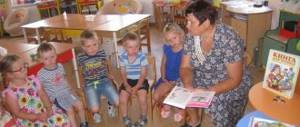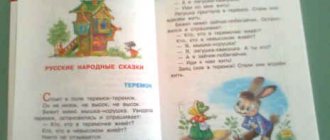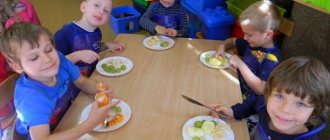The purpose of holding a theme week in kindergarten:
systematize children's knowledge about vegetables and fruits. To form the foundations of systems thinking and logical analysis of the surrounding reality when drawing up models of various objects. Continue to develop the ability to complete tasks in accordance with the algorithm. Develop attention, memory, thinking, imagination, speech. Enrich children's vocabulary. Develop communication skills and desire to provide assistance.
Monday: “What people grew.”
Goal: learn to classify vegetables and fruits. Strengthen the ability to depict their silhouettes on paper. Learn to change your point of view on ordinary objects by turning yourself into a vegetable or fruit. Develop cognitive interest. Enrich and expand the sphere of feelings, give them meaning. Develop aesthetic perception.
- Game - competition: "Question - answer"
- An apple's journey along the magical path "Sense Organs".
- Didactic game “In the garden or in the vegetable garden”
- Creative game to develop empathy: “Imagine that you are a vegetable, a fruit. What do you feel?"
- “Mom’s Helpers” - preparing salads.
- Artistic productive activity: drawing “Funny vegetables and fruits.”
- Design of an exhibition of drawings
Tuesday: "Gifts of the Autumn Queen"
Goal: to teach children to describe signs, give clear characteristics of shape, color, taste. Strengthen the ability to identify and name the composition of a group of objects (units) within 5. Cultivate an interest in understanding the natural world. Develop attention, memory, thinking.
- Surprise Moment: The Queen of Autumn Appears
- Solving the problematic question: “What’s in the basket?”
- Inspection and comparison of objects (vegetables and fruits).
- Game-exercise “By what criteria can you sort fruits and vegetables.”
- Intellectual and educational game “Arrange the fruits” (the quantitative composition of the number 5 from two smaller ones; the concepts of greater than, less than, equal to).
- Search and research activity “Define by taste.”
- Riddle games: “Skillful puzzles.”
- Long-term observations of a vegetable garden (on the site of a preschool institution).
Planning educational work on the topic “Vegetable garden. Vegetables" (senior group)
Planning educational work for October.
Theme of the month, week, day (Monday) “Vegetable garden. Vegetables".
Time
Joint activities between adults and children
Independent activities of children
Interaction with specialists, parents, social partners
Group, subgroup
individual
Morning
Morning exercises.
Conversation on the topic: “Tasty and healthy.”
Objectives: Teach children about the importance of regularly eating vegetables.
Examination of illustrations “Vegetables”.
Didactic game “Draw the same amount” (Dima, Lida, Danya Kh.).
Objectives: to consolidate in children the ability to establish correspondence between the number of objects, number and figure; consolidate the concepts of “same”, “equal amount”.
Role-playing game “Shop”, plot: “Vegetable shop”.
Objectives: to improve children’s ability to unite in play, distribute roles, and perform game actions.
Invite parents to go with their children to the market (fair) and look at the abundance of nature’s gifts (new harvest).
Organized educational activities
Speech development. Getting to know the variety of words, modeling, finding differences in two similar drawings.
Goal: to promote children’s understanding of the term “word” and its correct use. Continue to introduce the simplest modeling, depicting the word as a rectangle. Introduce a variety of words. Develop children's attention and visual functions by finding differences in two similar drawings. Develop fine motor skills. Develop skills of self-control and self-esteem. (E.V. Kolesnikova “From Word to Sound”, p. 4).
Drawing according to the content of riddles and poems. Riddles from the garden.
Goal: to learn to convey the shape and characteristic features of vegetables according to their description in riddles; create expressive color and fantasy images; mix paints yourself to obtain the desired shade; clarify the idea of well-known natural objects. (I.A. Lykova “Art activities in kindergarten”, p. 44).
Walk
Sky observation.
Objectives: invite children to look at the sky and describe it. Offer to return to the observation at the end of the walk, tell what has changed.
P/i "Carousel".
Objectives: exercise children in running in a circle, holding hands, changing tempo. Develop coordination of movements and attention.
Labor: work in the garden.
Outdoor game “Jumping over the ditch” (Polina, Yulia, Timofey, Sasha).
Objectives: to improve children's ability to jump on two legs across several lines in a row (teach them to take the correct starting position, land on bent legs).
Sports game badminton.
Objectives: teach children to hit a flying shuttlecock, toss and hit, introduce them to different ways of moving around the court.
Develop dexterity and joint mobility.
Games with external material.
Preparing for lunch. Dinner.
Preparation for sleep.
Reading a story by N. Nosov
"Gardeners."
Objectives: to develop artistic perception and aesthetic taste, to develop literary speech.
Canteen duty
(Semyon).
Objectives: to cultivate responsibility, conscientiousness, and develop teamwork skills.
Self-service: exercise “Let’s help Pinocchio get dressed.”
Objectives: teach children to dress and undress independently, carefully put clothes in a locker, and keep it in order.
Afternoon/evening
Health-improving activities after sleep: awakening gymnastics.
Work in the book corner: looking at artists’ illustrations of Russian folk tales familiar to children.
Objectives: invite children to try to remember fairy tales from illustrations, note the means of expression that determine the characters of the images.
Printed board game “ABC” (Seryozha, Egor, Danya P., Dasha F.).
Objectives: teach children to find familiar letters, form syllables and short words.
Games with building material "Machines".
Objectives: to form children’s ideas about various machines, their functional purpose, structure; about wheels and axles, about ways to attach them, to develop curiosity, ingenuity and creativity.
Organized educational activities
Physical education (according to the plan of the physical director)
Walk
Bird watching: magpie.
Objectives: teach children to observe birds, identify features of appearance and behavior, and learn to recognize birds by voice. Talk about the character and habits of the magpie, about the characteristics given to it in sayings and Russian folk tales.
P/n “Do as I say.”
Objectives: developing the ability to navigate in space, act according to verbal instructions, compare your actions with the rules of the game.
Planning educational work for October.
Theme of the month, week, day (Tuesday) “Vegetable garden. Vegetables".
Time
Joint activities between adults and children
Independent activities of children
Interaction with specialists, parents, social partners
Group, subgroup
individual
Morning
Morning exercises.
Conversation on the topic “Pills grow in the garden.”
Objectives: talk about the beneficial and medicinal properties of vegetables.
Individual work on FEMP. Didactic game “What, where?” (Lesha, Dima, Dasha F., Timofey).
Objectives: to consolidate the ability to determine the spatial arrangement of objects in relation to oneself, to denote it in words. Exercise children in counting within 6.
Independent play activity.
Objectives: to develop children’s independence, initiative, and to develop the ability to choose a game based on their interests.
Individual conversations and consultations at the request of parents.
Organized educational activities
Cognitive development (FCCM) “Vegetable garden”.
Goal: to strengthen the ability to distinguish between fruits and vegetables; develop sensory perception, microorientation skills on the table, verbally indicate the spatial arrangement of objects; improve motor skills in using stencils to depict vegetables and fruits; develop attention, thinking, memory, speech (N.E. Veraksa “Complex classes”, p. 64).
Application “Cucumbers and tomatoes lie on a plate.”
Goal: continue to practice the ability to cut out round and oval-shaped objects from paper in the form of squares and rectangles, cutting corners using a rounding method; develop coordination of movements of both hands; strengthen the ability to carefully paste images
(N.E. Veraksa “Complex classes”, p. 73).
Music (according to the music director's plan)
Walk
Observing the work of adults.
Objectives: discuss with children why they dig up soil in flower beds and dig up shrubs and trees. Explain how plants are prepared for winter.
Outdoor game "Wolf and kids".
Objectives: teach gaming activities with strict adherence to the rules;
develop reaction speed; cultivate courage.
Labor: sweeping the veranda.
Didactic game “It happens - it doesn’t happen” (Nikita V., Polina, Yulia, Lida).
Objectives: to develop analytical thinking, imagination, fantasy, to develop the ability to compare, to distinguish a real situation from an unreal one.
Sports game towns.
Tasks: continue to introduce children to a new game, teach them to hold the bat correctly, knock down pins by throwing it from the side or from the shoulder. Develop interest in sports games.
Preparing for lunch. Dinner.
Preparation for sleep.
Reading fiction at the request of children.
Objectives: to develop artistic perception and aesthetic taste, to develop literary speech.
Canteen duty (Egor).
Objectives: to develop working skills in a team, to cultivate diligence, responsibility for the assigned work.
Games with building material “Lethal vehicles”.
Objectives: to expand children’s understanding of various aircraft and their purpose. Develop design skills.
Afternoon/evening
Health-improving activities after sleep: awakening gymnastics.
Introduction to the art of painting: “What secret does a still life tell us?”
Objectives: to arouse children’s interest in a more complex type of still life, including depictions of living nature objects.
Individual work on speech development (Seryozha, Sasha, Semyon).
Objectives: to train children in writing descriptive stories about vegetables, to teach them to use quality adjectives.
Independent activity of children in activity centers.
Role-playing game "Hospital".
Objectives: develop interest in the game, develop knowledge about the function of the hospital, its role for people.
Walk
Observation: dew.
Tasks: draw children’s attention to the soil, grass, invite them to express opinions on how dew occurs, talk about this phenomenon. To develop children's powers of observation and love of nature.
Outdoor game “We are funny guys.”
Objectives: to develop the ability to act on a signal, to train children in running. Develop attention, coordination of movements, agility and endurance.
Independent motor activity of children.
.
Planning educational work for October.
Theme of the month, week, day (Wednesday) “Vegetable garden. Vegetables".
Time
Joint activities between adults and children
Independent activities of children
Interaction with specialists, parents, social partners
Group, subgroup
individual
Morning
Morning exercises.
Conversation on the topic “Take care of your health from a young age.”
Objectives: to develop the idea that health is the main value of human life. Develop cognitive interest.
Individual work with Lida, Timofey, Egor on fiction
Objectives: to practice the ability to recite short poems by heart.
Role-playing game “Shop”: plot “Vegetable shop”.
Objectives: to teach children to use their ideas about the work of a store, the work of sellers, and loaders in the game.
Individual conversations about children's successes.
Organized educational activities
Speech development. Theme "Vegetables".
Goal: to teach children to name vegetables, to consolidate the general concept of “vegetables” in the dictionary, to teach them to write stories about vegetables according to the proposed visual plan. Introduce children to polysemantic words, explain the difference in the meanings of these words. (N.E. Teremkova “Speech therapy homework for children 5-7 years old with OHP”, p. 5).
…
Wednesday: “The Journey of Senor Tomato”
Goal: to consolidate the understanding of food products made from vegetables and fruits. Develop the ability to imagine and operate with the incredible, unusual, and fantastic. Develop the ability to establish cause-and-effect relationships. Cultivate feelings of joy from unity with nature. Develop imagination, attention, and the ability to listen to the opinions of peers.
- A surprise moment: the postman brings a chest (in the recording is the voice of Señor Tomato asking for help).
- Crossword puzzle solution (keyword - Tomato).
- A fun game with Tomato “Bragging”.
- Creative task using the RTV method - TRIZ technology: working with a system operator.
- Juicer experience.
- Game “Looking for Friends” (using elements of RTV - TRIZ technology).
- Artistic productive activity: application “Friends of Senor Tomato.”
Thursday: “Wonderful vegetables and fruits”
Goal: to develop the ability to identify the main features of objects. Induce an emotional perception of natural objects. To teach, based on the mental operations of comparison, analysis and synthesis, to correlate a hypothetical assumption with reality. Develop a sense of rhythm, plasticity and expressiveness of movements, and revive imagination.
- Creation of theatrical advertising of vegetables and fruits.
- Creative task using the RTV method - TRIZ technology: the game “Good - Bad”.
- Plastic sketch “Fruit tree”.
- Compiling a fairy tale based on a sign.
- Comparison of seeds in vegetables and fruits.
- Making kokoshniks of vegetables and fruits.
Friday: “I was born a gardener...”
Goal: to activate and consolidate children’s understanding of vegetables and fruits. To consolidate children's knowledge about the characteristic external and internal signs of vegetables and fruits. Stimulate the development of search and analytical thinking by introducing them to a problem situation. Encourage the use of reasoning and explanations in speech. Develop speech creativity.
- Word game: “I was born a gardener...”
- Game - confusion "Teremok"
- Educational game: “Analogies”.
- Search and research activities: examining pieces of kiwi, orange and other fruits under a microscope.
- Theater lounge “Come on, fruits, in a row!”



